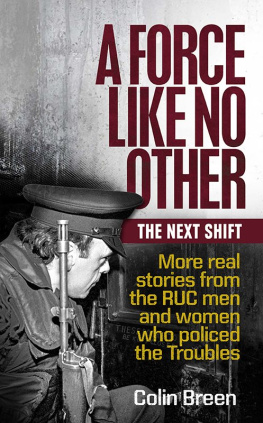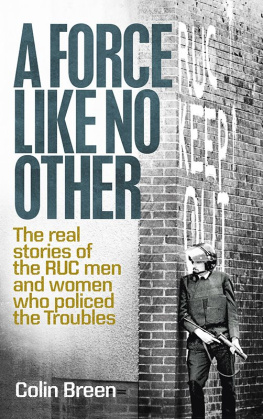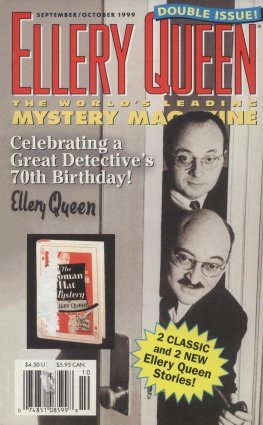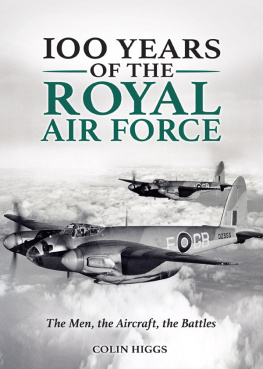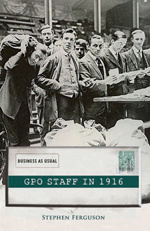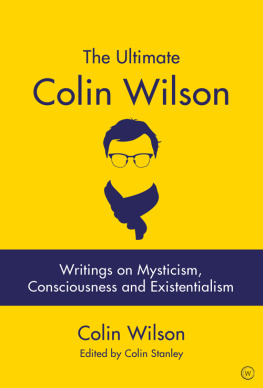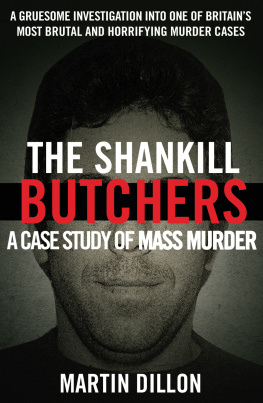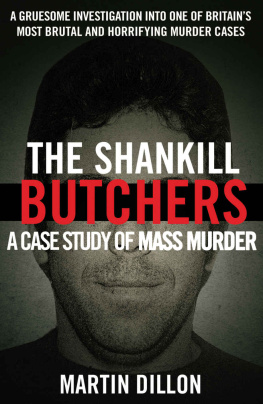COLIN BREEN is a freelance journalist, screenwriter and broadcaster. He has written extensively for many newspapers, including the Belfast Telegraph, Sunday Life and Herald Dublin, and is a regular commentator on local and national radio, television and the BBC World Service. He served as an officer in the RUC for over fourteen years at the height of the Troubles. A Force Like No Other: The Next Shift is the follow-up to his bestselling A Force Like No Other (2017).

If you are a former member of the RUC and have a story to tell, please do not hesitate to contact me at
First published in 2019 by Blackstaff Press an imprint of Colourpoint Creative Ltd
Colourpoint House
Jubilee Business Park
21 Jubilee Road
Newtownards BT23 4YH
Colin Breen, 2019
Cover design by Two Associates
Cover photograph: Night Patrol with the RUC, April 1986 Pacemaker Press International, Belfast
All rights reserved
Colin Breen has asserted his right under the Copyright, Designs and Patents Act 1988 to be identified as the author of this work.
Produced by Blackstaff Press
A cip catalogue for this book is available from the British Library
EPUB ISBN 978 1 78073 251 0
MOBI ISBN 978 1 78073 252 7
www.blackstaffpress.com
Some names and identifying details have been changed to protect the privacy of individuals.
I dedicate this book to the memory of police officers everywhere who have made the ultimate sacrifice, and particularly to the 302 members of the Royal Ulster Constabulary who died during the Troubles.
For peace we served.
In memory also of my brother Robin Breen, late of the Toronto Police Service.
Introduction
In 2001, the Royal Ulster Constabulary was officially renamed, becoming the Police Service of Northern Ireland. I was all too aware that it marked the end of a remarkable era in policing. After all, over the course of thirty years, the RUC had evolved from a small rural-type service to the most internationally respected anti-terrorist police force in the world, and one whose former members still train other forces across the globe.
I began work on my first book, A Force Like No Other (2017) because I felt it was important that former members of the RUC be given the opportunity to record for history what it was like to police the violence that plagued Northern Ireland; to tell our stories in our own words. This is particularly important in light of the losses the force experienced from the outbreak of the Troubles in 1969 until 2001, 302 police officers were killed; over 10,000 were injured; and hundreds were left disabled or seriously injured. I knew when I had finished the book, however, that I had only included a small fraction of all the stories that could have been told, including many of my own.
In the years that followed the books publication, a number of former officers got in contact some to say how important it was to them that our stories were finally being told, others to ask if there would be another book as they wished to contribute. They too wanted their voices heard. At the same time, I began to lose count of the number of times members of the public got in contact to ask me about specific stories, and indeed about the book generally. A great many of them, it turned out, had extended family who were former members of the RUC and they wanted to get a glimpse beyond the white tape, to get an insight into what their relatives had been through. I knew that I needed to do a second book.
Some of the colleagues who contacted me sent me their stories by email or post, but most I talked to face to face, travelling across Northern Ireland to visit them. Meeting so many new people from the force was a pleasure, but their stories were, at times, harrowing. Some struggled with the retelling, others tried but simply couldnt manage to do it yet it was too much for them to revisit the horrors they had seen. Often these were stories they hadnt ever been able to tell even their families. Thinking about the past brought back the demons, sleepless nights or nightmares. My heart went out to them all too often officers were left to suffer in silence as its not in our nature to seek help and, for a long time, there was only minimal support on offer.
In many ways, this is a darker book than its predecessor for some of the more horrific incidents, the details are so upsetting and violent that they had to be left out of the book, out of respect for the victims and their families. That this book is more sombre is not by design, these are simply the stories that people needed to tell. The same dark humour is here, though, and moments of absurdity, as is the fierce loyalty. If anything, the sense of camaraderie that existed in the RUC is even more apparent as strong among its former members today as it ever was. Despite the dangers they faced, many of the officers I spoke to felt their years in the RUC were the best of their lives. Trusting someone with your life as you ran towards danger, knowing that you all had each others backs, creates an unbreakable bond for life. Very often it was only that, and the black gallows humour, that kept officers sane as they carried out their duty. For some, a bottle of whiskey also helped.
This book shows the human face behind the uniform and how ordinary people coped in extraordinary times. Throughout the Troubles and all the years of violence directed towards the police force, officers did their best with the cards they were dealt. These stories show how their career choice shaped, changed and, in some cases, ruined their lives but they also show how the human spirit can triumph in the darkest of moments, against all the odds.
Earlies
07:0015:00 hours
07:00 Carryduff Police Station, County Down
It is often said in the police that the best weapon you have when dealing with awkward situations is your tongue. But sometimes youre not as clever as you think.
There was a time in the RUC when the village sergeant ranked in importance with the clergy, the bank manager and the local doctor; was respected and even looked up to. But that didnt mean we were infallible!
One time, when I was stationed in Carryduff just outside Belfast, an early-morning road traffic accident was causing a young probationer constable some consternation. It was not a serious accident in fact there was only one car involved, there were no injuries, the only damage caused was to the car concerned and we knew the driver but, believe it or not, back in the day such accidents were fully investigated.
The dilemma was that the driver, a well-known local farmer, couldnt or said he couldnt remember what had happened to cause the accident. He came to the station the next evening to be interviewed. He produced the necessary documents, but talking the matter over, it was obvious that the young constable was no match for this worldly-wise gentleman. He asked for my help so I intimated that he should leave the room and let me have a word with the farmer.
I was left alone with the driver, who was well known to me. I suggested that, as he couldnt remember what happened, I would paint a scenario of what I thought might have happened to see if that jogged his memory. He thought this was an excellent idea, so I began: John, I think you were driving along the road and you hit the curb, causing the car to mount the left-hand bank. The car turned over completely, rolled back down the bank and landed on its wheels back on the main road.
Aye, Sergeant, that does sound familiar.
And then, John, you decided to keep driving to try and get away but ended up crossing the road, where you then went up the right-hand bank, rolled the car over again, and landed back down on the roadway.
Next page
